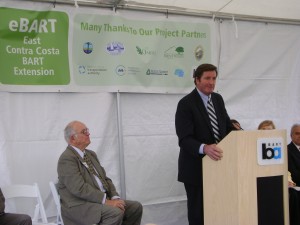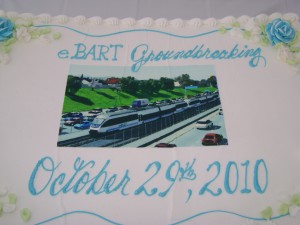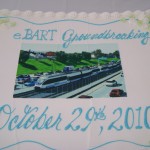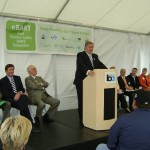eBART Transfer Station Groundbreaking Celebrated
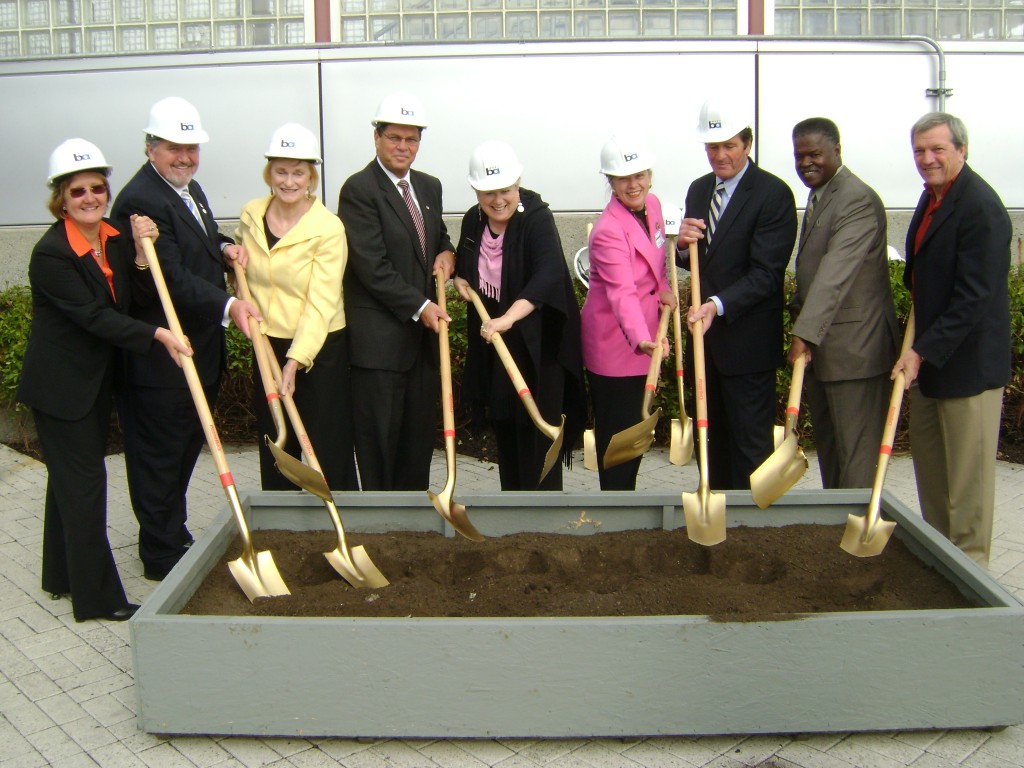
Orinda Councilwoman and MTC Member Amy Wirth, Antioch Mayor Jim Davis, BART Directors Gayle Murray and Joel Keller, Antioch Councilwoman Martha Parsons, BART General Manager Dorothy Duggers, Congressman John Garamendi, Supervisor Federal Glover and State Senator Mark DeSaulnier turn the ceremonial first spades of dirt on the eBART Project.
By Allen Payton, Publisher
It was a day of celebrating accomplishments and new beginnings, with a cake, hardhats and gold-painted shovels, as all the key current and former elected officials, and staff who had anything to do with the eBART extension in East County gathered for the ground breaking of the Transfer Station on Friday, October 29 at the Pittsburg/Bay Point BART station.
BART Director Joel Keller, who served as MC and first proposed the idea of eBART, pointed out that it took “all the local officials in our community working together. If it wasn’t for all that support, we wouldn’t be standing here, today.”
“I think it’s important for East County that we’ve made a down payment on our long awaited, long overdue extension to East County,” he added.
The $26 million first-phase, will provide a facility approximately 400 feet east of the BART station, where an expected 14,000 travelers each day, from Antioch and Pittsburg will get off the eBART cars, cross a platform, get onto a BART train, and then travel to the BART station to pick up the rest of the passengers before heading West to the North Concord/Martinez station and beyond.
On the dais representing the various participating agencies, were BART Directors Keller, Gayle Murray and Tom Blaylock, Congressman John Garamendi, State Senator Mark DeSaulnier, Supervisor Federal Glover, CalTrans District 4 Director Bijan Sartipi, the four East County Mayors: Jim Davis of Antioch, Sal Evola of Pittsburg, Pat Anderson of Oakley, and Bob Taylor of Brentwood, who is also Chair of the Contra Costa Transportation Authority (CCTA), as well as Steve Heminger, Executive Director of the Metropolitan Transportation Commission (MTC) and Randy Wysocki, Executive Director of the CCTA.
In the audience from Antioch were Mayor Pro Tem Mary Rocha, Councilmembers Brian Kalinowski and Martha Parsons, former Mayor Don Freitas, who served as Chair of the eBART Project Policy Advisory Committee (EPPAC), City Manager Jim Jakel, former Community Development Director Joe Brandt and Director of Advance Planning Victor Carniglia, as well as Contra Costa Central Labor Council Executive Director Greg Feere.
Also in attendance was soon-to-be State Assemblywoman and current County Supervisor Susan Bonilla as well as BART’s General Manager Dorothy Duggers.
Many of them had something to share about their own experiences with BART and helping make eBART a reality.
“When Joel Keller came to my office a number of years back talking about eBART, I was ‘wondering what’s eBART? We’ve been paying into the system for years for traditional BART,’” Glover shared. “But, Joel had a vision…and he was able to sell it.”
“Today, we have a system that works. We’re on the verge of really delivering on the promise from many years ago,” he added.
Mayor Davis thanked the taxpayers “who for all these years have paid for BART” and reminisced. “I can remember as a second grader at Kimball and looking at a mock-up of a BART car.”
Addressing the concerns of East County not getting full BART, Davis stated “I predict that after this project is completed, we’re going to stop and s
ay what was all the fuss about?”
Finally, giving credit where credit is due, he added, “I also want to acknowledge my predecessor, former Mayor Don Freitas, without whose hard work, this day would not be possible.”
Keller gave a bit of a history lesson on the eBART Project. “When I first got elected in ’94 we started the discussion of alternative technology. Former [BART] GM Tom Margro used his position to have staff look at alternatives. Tom went to TriDelta Transit in March, 2001.” The project proceeded from there.
But, not satisfied with ending the eBART line at Hillcrest in Antioch, as he introduced each speaker, Keller asked to laughter, “Did I mention for $2 million we can do the EIR to get to Laurel Road?”
The widening of Highway 4 will accommodate two lines of eBART in the median of the freeway.
“I want to thank the voters who voted for Measure C and its extension, Measure J,” stated CCTA’s Wysocki. “For having the foresight and the vision to vote for both measures which will result in $1 billion invested in State Route 4.”
“I wish we could do more,” MTC’s Heminger said. “We’re getting great bids right now.”
A large portion of the funding is coming from the tolls from the six Bay Area bridges (not including the Golden Gate) which are distributed by the MTC.
“It’s time for the Congress to pass a new transportation funding bill,” he added, which was met by great applause. “But, we’re going to have to continue to help ourselves. This region has always been a trailblazer and has funded these projects.”
Following the official ceremonies, Freitas shared his thoughts.
“The eBART brought East Contra Costa together. We’ve been able to have Highway 4, eBART and the Highway 4 Bypass,” said Freitas. “This is long, long overdue.We live at the end of a cul-de-sac. You don’t hear that used anymore.
“It’s really about economic development and bringing jobs to East Contra Costa. That’s the most exciting part. Some of the former officials really had a vision. And it’s all coming to fruition.
Reiterating what Keller has said all along, Freitas shared, “It’s just really an interim step. No one should think the job is done. We have to continue moving east…to have jobs in our local community.”
The 10-mile eBART project from the Pittsburg/Bay Point BART station to Hillcrest Avenue, including a station at Railroad Avenue in Pittsburg, will take approximately five years to build, at a cost of $462 million. For more information, visit www.bart.gov/about/projects/ecc/.
the attachments to this post:
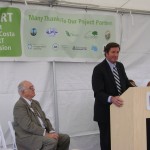
Garamendi Speaks at eBART Groundbreaking










